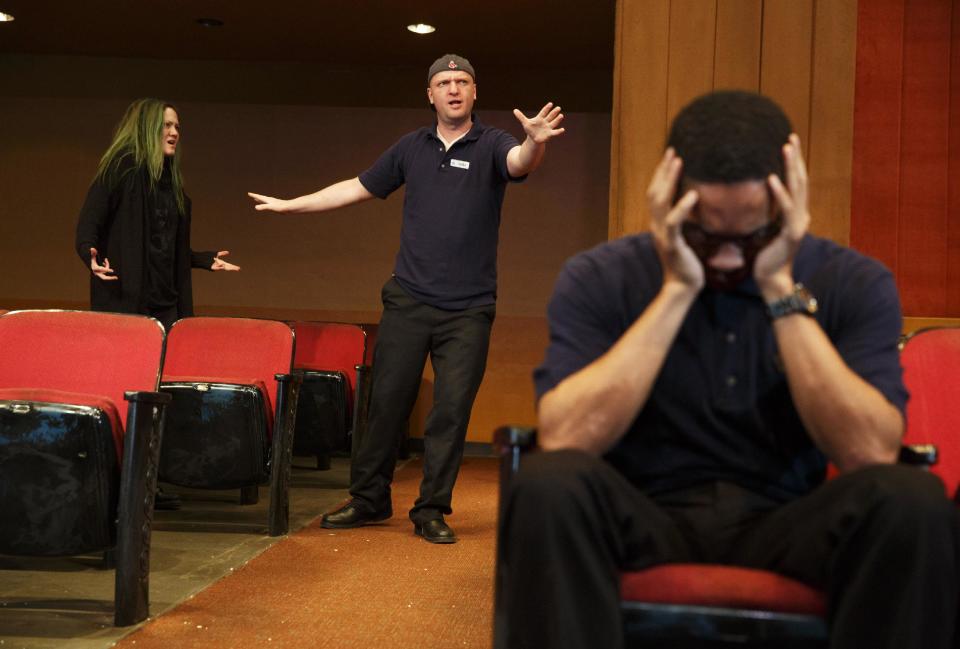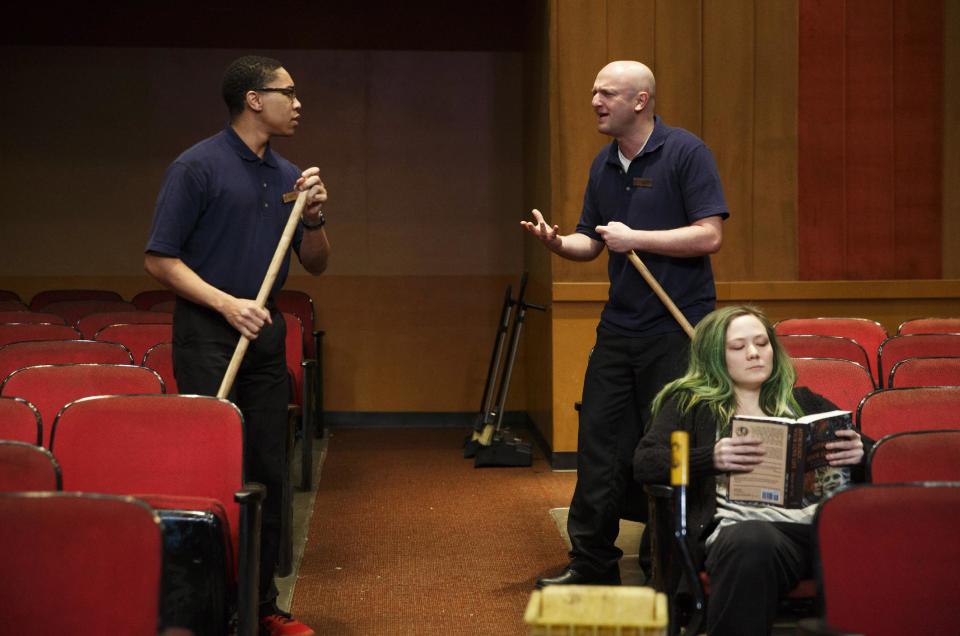Review: Annie Baker's 'The Flick' slow but funny
NEW YORK (AP) — If you're getting repeatedly passed over for promotion in a tedious job by younger co-workers, you'll find a lot to relate to in Annie Baker's latest play, "The Flick."
That sentiment is shared more frankly by an under-achieving character in Obie Award-winning playwright Baker's touching new comedy about friendship, morality, and loyalty. The world premiere opened Tuesday night off-Broadway, in a sometimes slow but very funny presentation by Playwrights Horizons, directed by Sam Gold.
Three relatively youthful, low-paid employees work together in a rundown movie theater in Massachusetts that still shows 35-millimeter movies on film. Everyday jealousies, disappointments and anger share the stage with jokes, chit-chat, occasional poignant revelations and a lot of workplace tedium.
Old-timer Sam, (a hilarious and affecting performance by Matthew Maher) is in his 30s and still living with his parents. He shows the theater-cleaning process to a newbie, Avery, well-portrayed as serious and dorky by Aaron Clifton Moten. Wearing owlish, black-rimmed glasses, Avery's a low-key, egghead-type student on hiatus from college who happens to be a prodigious film buff.
Above them, handling the coveted job of projectionist in a glass-windowed booth, we see glimpses of green-haired Rose. A recent college graduate that everyone seems to find attractive despite her baggy clothes, Rose is given an air of beguiling crankiness by Lousa Krause. With Baker's gift for realistic-sounding dialogue and quiet irony, this group is recognizable as average young people who each have very specific, appealing quirks and issues.
The theater audience, which is located behind the theoretical movie screen, faces ten or so rows of empty, faded, red-velvet-covered seats. While picking up trash between movies and cleaning the floor, over and over, Sam and Avery make small talk and play six-degrees-of-movie-separation, connecting one actor to another through a series of co-stars.
Maher's physical comedy invigorates every scene he's in. Although on the surface Sam seems to be a bit of a slow-witted, boyish man with a weird sense of humor, Maher creates a comical, multi-dimensional and realistic persona for him. Reacting to events by freezing up with expressive body language and hooded stare, he causes eruptions of audience laughter without saying a word.
When Rose unexpectedly expresses interest in hanging out with Avery, secretly lovelorn Sam begins a slow simmer of jealousy. Krause contorts herself to hilarious effect when Rose flirts awkwardly with Avery in an impromptu hip-hop performance. Eventually, there are confessions and confrontations and later, Avery's belief in the best in people is shaken by a workplace crisis involving new management.
Gold, who just directed "Picnic" on Broadway, has received Obie (and other) awards for directing two of Baker's previous plays, "Circle Mirror Transformation" and "The Aliens." While he gets engaging performances here from all three actors, the action is stretched out way too long and the play sags in several silent scenes. The tedious, repetitive nature of these low-paying jobs could be conveyed onstage more concisely, with less unnecessarily prolonged silences or extended epilogue music from films.
David Zinn's set is perfectly designed, down to the water stains on the ceiling and the useless, slowly revolving ceiling fans. It would just be nice if the overly bright light being used as the projector wasn't aimed straight into the eyes of the audience for several minutes at a time; it made some of us as cranky as Rose.
___
Online:
http://www.playwrightshorizons.org


